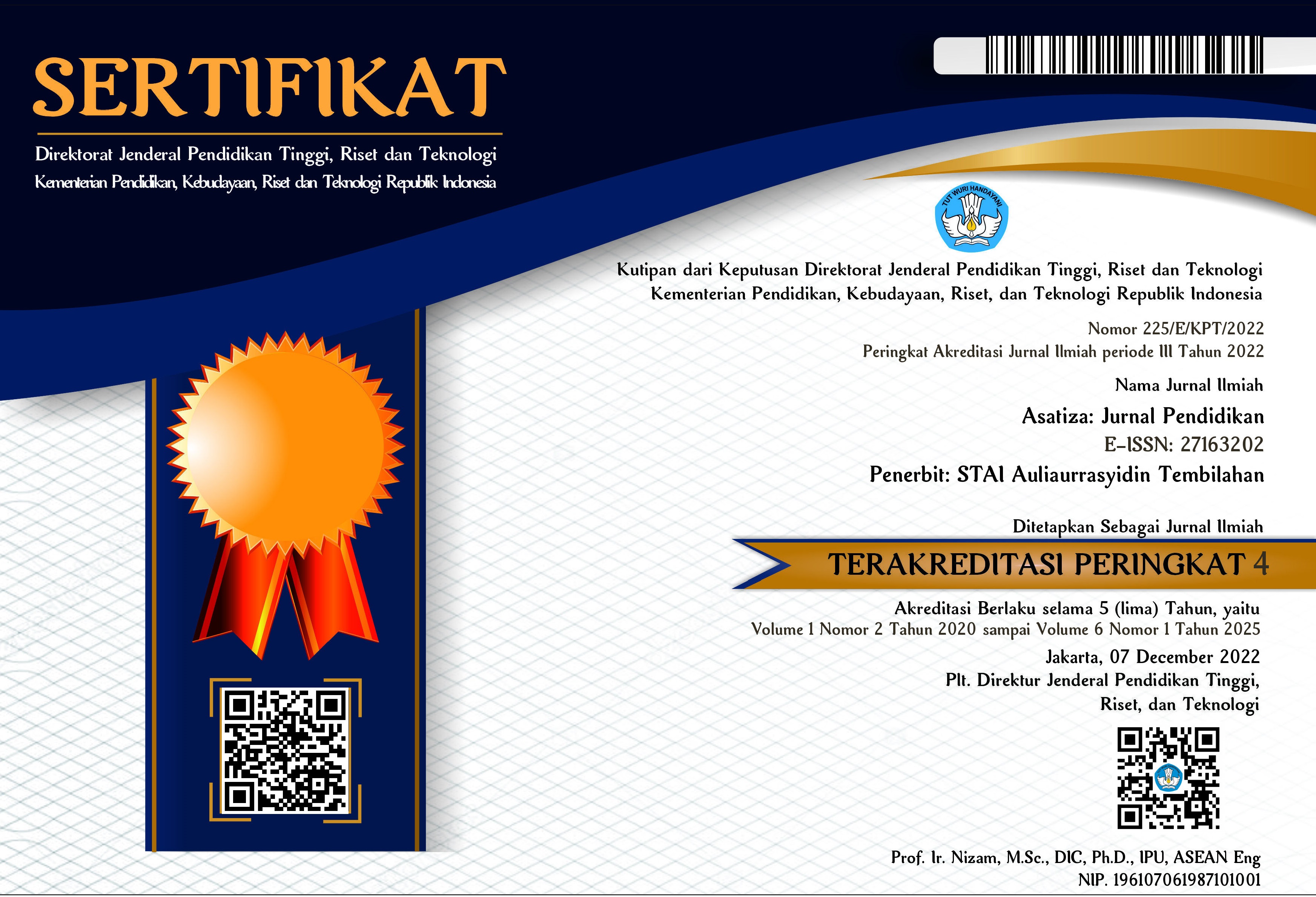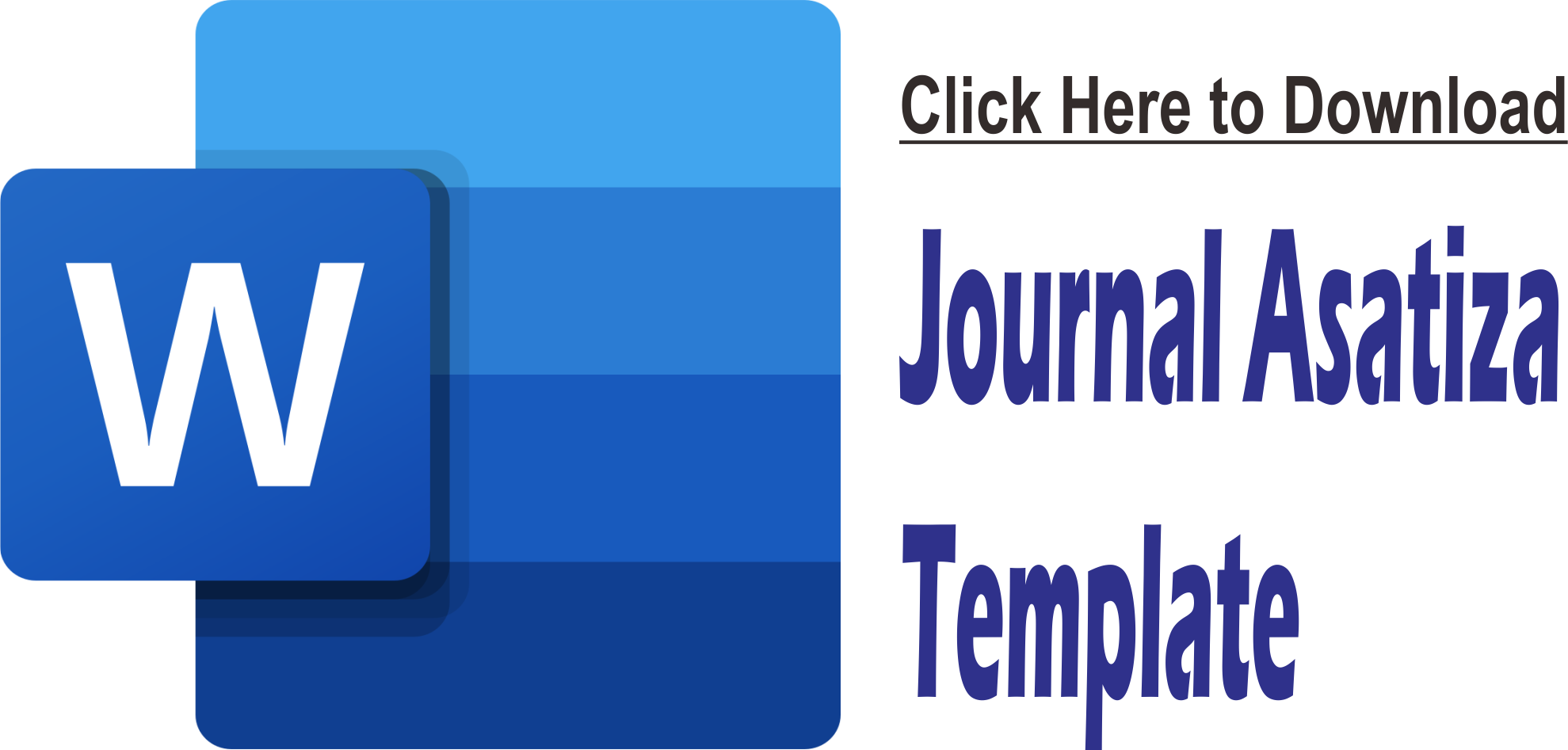Teori Pembelajaran Humanisme dalam Perspektif Pendidikan Islam
DOI:
https://doi.org/10.46963/asatiza.v3i3.755Keywords:
Learning Theory, Learning Humanism, Islamic EducationAbstract
Education is a word that is familiar to hear in life. Everyone generally does it. Education does not only take place in school buildings or institutions, but education also exists in the community and family. Previous learning theories have emphasized the role of environmental and cognitive factors in the educational and learning process. The learning process still focuses on the teacher as the main source of knowledge, and schools are the main choice for learning strategies. Humanism theory clearly shows that learning is influenced and guided by the way students think and behave, and by the personal meanings and emotions derived from their learning experiences. This theory seeks to understand learning behavior from the actor's perspective rather than from an observational perspective. This study uses qualitative research with a library research approach. The purpose of this study is to find out how the theory of humanism learning according to the perspective of Islamic education.
Downloads
References
Farida, Y. E. (2015). Humanisme dalam pendidikan Islam. Tarbawi : Jurnal Pendidikan Islam, 12(1), 105–120. https://doi.org/10.34001/tarbawi.v12i1.306
Iswati, & Rohaningsih, C. (2021). Pembelajaran PAI Melalui Pendekatan Humanistik Pada Anak Berkebutuhan Khusus Di Sekolah Inklusi. Al I’tibar: Jurnal Pendidikan Islam, 8(2), 81–91. https://doi.org/10.30599/jpia.v8i2.1093
Labaso’, S., & Hestiana, R. . (2021). Pengembangan teori pembelajaran humanisme menurut jurgen habermas serta relevansinya dalam pendidikan Islam. Early Childhood Islamic Education Journal, 2(1), 28–51. https://doi.org/10.58176/eciejournal.v2i1.223
Muhtadi, M. (2021). Pendidikan humanistik dalam perspektif Al-Qur’an. Al Ashriyyah, 7(1), 37-54. https://doi.org/10.53038/alashriyyah.v7i01.140
Nasution, H. A., & Suyadi, S. (2020). Pembelajaran pendidikan agama Islam Humanistik dengan pendekatan active learning di SDN Nugopuro Gowok. Jurnal Pendidikan Agama Islam, 17(1), 31–42. https://doi.org/10.14421/jpai.2020.171-03
Rahayu, F. (2019). Konsep dasar evaluasi dalam pendidikan Islam. Jurnal Ilmiah Iqra’, 13(2), 1–14. http://dx.doi.org/10.30984/jii.v13i2.933
Rahimi. (2021). Teori belajar humanisme dalam perspektif pendidikan Islam. Al-Ikhtibar: Jurnal Ilmu Pendidikan, 8(1), 18-29. https://doi.org/10.32505/ikhtibar.v8i1.621
Safitri, E. N., & Az-Zafi, A. (2020). Konsep humanisme ditinjau dari perspektif pendidikan Islam. Al-Murabbi: Jurnal Studi Kependidikan dan Keislaman, 7(1), 78–89. https://doi.org/10.53627/jam.v7i1.3842
Solichin, M. M. (2018). Teori belajar humanistik dan aplikasinya dalam pendidikan agama Islam: Telaah materi dan metode pembelajaran. Islamuna: Jurnal Studi Islam, 5(1), 1–12. https://doi.org/10.19105/islamuna.v5i1.1856
Utami, E. N. (2020). Teori belajar humanistik dan implementasinya dalam pelajaran pendidikan agama Islam. Mudarissuna, 10(4), 574–584. http://dx.doi.org/10.22373/jm.v10i4.6978
Downloads
Published
Issue
Section
License
Copyright (c) 2022 Desy Khusna Nurmaida , Nasrullah Nasrullah, syarifudin syarifudin

This work is licensed under a Creative Commons Attribution-ShareAlike 4.0 International License.
Authors who publish with this journal agree to the following terms:
1. Copyright on any article is retained by the author(s).
2. The author grants the journal, right of first publication with the work simultaneously licensed under a Creative Commons Attribution shareAlike 4.0 International License that allows others to share the work with an acknowledgment of the work’s authorship and initial publication in this journal.
3. Authors are able to enter into separate, additional contractual arrangements for the non-exclusive distribution of the journal’s published version of the work (e.g., post it to an institutional repository or publish it in a book), with an acknowledgment of its initial publication in this journal.
4. Authors are permitted and encouraged to post their work online (e.g., in institutional repositories or on their website) prior to and during the submission process, as it can lead to productive exchanges, as well as earlier and greater citation of published work.
5. The article and any associated published material is distributed under the Creative Commons Attribution-ShareAlike 4.0 International License











2.png)



